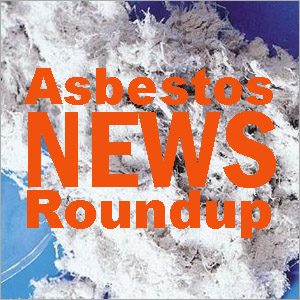Asbestos News Roundup: 10.7.10
October 7th, 2010. By LucyC
A roundup of recent asbestos-related news and information that you should be aware of.
Asbestos Lawsuits
St. Clair, IL: Lovell L. Kennard has filed a lawsuit against 27 defendants who he alleges caused the death of his mother, saying she inhaled asbestos fibers after her husband brought them home on his clothes.
Kennard claims his mother, Eula Kennard, suffered secondary or take-home exposure resulting from exposure to asbestos fibers through her late husband, Joseph Kennard, who worked as a box car builder at Pullman Standard, as a laborer at Ceco Steel and as a laborer at American Cast Iron Pipe Company from the 1950s through the 1980s.
As a consequence of this exposure, Mrs. Kennard developed lung cancer, which led to her death Jan. 15, 2009, the complaint states.
Kennard claims that prior to his mother’s death, she incurred medical costs, experienced great physical pain and mental anguish and was hindered and prevented from attending to her normal course of employment. Further, because of Eula Kennard’s death, her family has been deprived of her support, have lost her society and have incurred funeral and burial costs, Kennards claims.
Kennard is seeking $200,000 for economic damages, $50,000 for punitive and exemplary damages, $100,000 in compensatory damages, punitive damages in an amount sufficient to punish Sprinkmann Sons Corporation and Young Insulation Group to deter them from their misconduct and a judgment for more than $150,000. (stclairrecord.com)
Jefferson County, TX: Katherine Arceneaux, the widow of Charles Arceneaux, together with three of their children, have filed an asbestos lawsuit against Texaco and Chevron USA, alleging the two oil giants are responsible for Charles Arceneaux’s death.
The suit claims that Arceneaux was employed by Texaco at its Port Arthur refinery, working as a brick layer, carpenter and general laborer, and during his employment he was exposed to asbestos dust, causing him to develop asbestosis, “for which he died a painful and terrible death on Aug. 8, 2009,” court papers say.
The suit alleges the defendants knew for decades asbestos products could cause asbestosis but still allowed their employees to work with and around asbestos products in the workplace. (setexasrecord.com)
Galveston, TX: BP Corp North America is facing an asbestos lawsuit filed by Everett and Cheryl Cannon. Everett Cannon was diagnosed with lung cancer on August 23, 2010.
The Cannons allege that Everett Cannon’s illness was a result of lengthy exposure to asbestos during his nine-year term of employment at Amoco Oil, the predecessor to BP from 1967 to 1976.
The suit faults BP for Amoco’s reportedly improper supervision of operations at the facility where Everett Cannon worked in addition to the company’s supposed knowledge that its asbestos-laced products presented a dangerous health risk. Consequently, the plaintiffs seek unspecified monetary damages as well as a jury trial. (setexasrecord.com)
Asbestos Hot Spots
Pittsburgh, PA: The Department of the Environment (DEP) spent several days this week taking soil, air and water samples at the former Jeanette glass factory property, in Pittsburgh. The DEP, armed with search warrants, were looking for evidence of environmental violations at the site, which is owned by Abe Zion of New York. If Zion is found to have committed violations he could be made to clean up the site and pay fines.
The site is neighborhood landmark. Bill Sarge of North Huntingdon, who worked in the purchasing department at the factory, remembers weekly deliveries of barrels of arsenic, marked with skull and crossbones, arriving at from Mexico. This went on for the entire 10 years he worked there.
And he remembers asbestos. “There were sheets and sheets of asbestos everywhere in the plant,” he told the Tribune Review. Waste products were simply dumped onto the ground, and empty barrels were given away to employees, he said. “Disposal knowledge at the time was nil,” Sarge said. “They didn’t properly dispose of anything. This place was a hazard from Jump Street.”
Rob Fejes grew up in a house on one side of the former Jeannette Glass factory and now operates his business opposite the site. While growing up there he recalls seeing his father’s car covered with white silt in the mornings, residue from the glassmaking process at the plant. “There would be particles on your car just like at a steel mill,” Fejes told the Tribune.
Fejes said his parents and other city residents weren’t concerned at the time about any possible adverse health consequences stemming from the arsenic, asbestos fibers and lead that may have contaminated the soil and groundwater near the plant on Bullitt Avenue. But now, concern is growing. A lot depends on the outcome of the DEP investigation. Residents are particularly concerned that any contamination may have found its way into the soil and ground water. (Pittsburgh Tribune-Review.com)
-
Leave a Reply
Archive by Category
- Accidents (24)
- Airlines (9)
- Asbestos Mesothelioma (262)
- Automotive (25)
- Celebrity (14)
- Class Action (84)
- Complaints/Comments (15)
- Consumer Fraud (84)
- Contest (2)
- Court of Public Opinion (5)
- Crazy Sh*t Lawyers See (61)
- Criminal Law (4)
- Defective Products (111)
- DePuy ASR Hip Recall (2)
- Discrimination (22)
- Drugs/Medical (248)
- Elder Care Abuse (4)
- Emerging Issues (462)
- Employment (54)
- Environment (52)
- Financial (28)
- Food Illness (15)
- Human/Civil Rights (4)
- Insecurities (5)
- Insurance (16)
- Intellectual Property (16)
- Internet/E-commerce (19)
- lawsuits (161)
- Lawyers (20)
- Lawyers Giving Back (43)
- Lex Levity (10)
- Personal Injury (106)
- Pleading Ignorance (53)
- Real Estate (2)
- Recall (6)
- Scam (3)
- Securities (13)
- Settlement (81)
- Tort Reform (2)
- Totally Tortelicious (81)
- Veterans (11)
- Whistleblower (9)